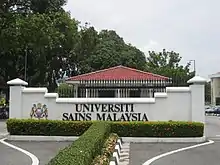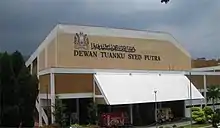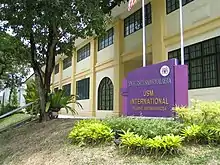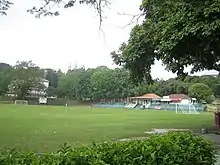Universiti Sains Malaysia
Universiti Sains Malaysia (abbreviated as USM) is a public research university in Malaysia. Founded on 1 June 1969 as a statutory body with its own constitution, it is among the oldest institutes of higher learning in Northern Malaysia. It has three campuses: a main campus on the island of Penang, a health campus in Kelantan, and an engineering campus in Nibong Tebal. There is currently an overseas collaboration with KLE University, India offering the Doctor of Medicine (USM) undergraduate degree. USM plans to open a Global Campus (Kuala Lumpur Campus) in Kuala Lumpur Education City (KLCE).[6][7]
 | |
| Motto | Kami Memimpin |
|---|---|
Motto in English | We Lead |
| Type | Public research university |
| Established | 1 June 1969[1][2] |
| Chancellor | His Royal Highness the Raja of Perlis, Tuanku Syed Sirajuddin ibni Almarhum Tuanku Syed Putra Jamalullail |
| Vice-Chancellor | Professor Dr. Faisal Rafiq Mahamd Adikan (4 October 2019)[3] |
Academic staff | 2,206[4] |
| Students | 24,375 (2016)[4] |
| Undergraduates | 17,306 (2016)[4] |
| Postgraduates | 7,069 (2016)[4] |
| Location | , |
| Campus | Main Campus (Gelugor, Penang) Health Campus (Kubang Kerian, Kelantan) Engineering Campus (Nibong Tebal, Penang) International Medical Programme Campus (Belgaum, India) |
| Affiliations | ASAIHL, ACU, FUIW,[5] APUCEN, UAiTED |
| Website | www |
With around 28,300 postgraduate and undergraduate students in 2009,[8] USM is one of the largest universities in terms of enrollment in Malaysia. The number of lecturers is about 1,479, which leads to a student-lecturer ratio of around 19:1.
USM is the only Accelerated Programs for Excellence (APEX) government-funded autonomous university in Malaysia.[9][10]
History
The idea of a university in Penang was first mooted by D. S. Ramanathan in 1959 in the State Assembly and later crystallised when he was nominated chairman of the Penang University Project committee.[11] The acquisition of a piece of land in Sungai Ara was then followed by the ceremonial laying of the foundation stone by the then Prime Minister of Malaysia, Y.T.M Tunku Abdul Rahman Putra Al-Haj on 7 August 1967.
USM was established as a statutory body in 1969 as the second university in Malaysia. It was first known as Universiti Pulau Pinang. The university operated on borrowed premises at the Malayan Teachers' Training College at Gelugor. In 1971, it moved to its present 239-hectare site at Minden (formerly Minden Barracks of the British Far East Command) in Gelugor, 10 kilometres from the city of Georgetown.
There are two other USM campuses: one at Kubang Kerian in Kelantan, known as the Health campus, and the other at Seri Ampangan, Nibong Tebal in Penang, known as the Engineering campus. The former houses the School of Medical Sciences, the School of Health Sciences and the School of Dental Sciences, while the latter houses the six engineering schools.
Universiti Sains Malaysia teaches in the fields of Pure Sciences, Applied Sciences, Pharmaceutical Sciences, Building Science and Technology, Social Sciences, Humanities and Education as well as conducts research.
USM offers courses at undergraduate and postgraduate levels to more than 28,000 students. USM has won the Asian Innovation Award in which USM emerged as the only winner from this country.[12]
The list of vice-chancellors of the Universiti Sains Malaysia
| No. | Vice-Chancellor | Academic Qualification | Honorable & Awards Received | Term in office |
|---|---|---|---|---|
| 1 | Professor Tan Sri Datuk Dr. Hamzah Sendut | Bachelor of Arts in Geography(Malaya), Master of Civil Design(Liverpool), PhD in Science(Tokyo). | PSM, DSPN, Hon. Doc.(Strathclyde), Hon. Doc.(Kyung Hee), Hon Doc.(USM) | 1969–1976 |
| 2 | Tun Hamdan Sheikh Tahir | Bachelor of Arts in History(Malaya), Master of Social Science(Nottingham). | SMN, PSM, DMPN, KMN, Hon. Doc.(USM), Hon. Doc.(UPM) | 1976–1982 |
| 3 | Tan Sri Dato’ Seri Musa Mohamad | Bachelor of Science in Pharmacy(Singapore), Master of Science in Pharmaceutical Technology(London). | PSM, DSPN, Hon. Doc.(USM), Hon. Doc.(UMS), Hon. Doc.(UNIMAP), Hon. Doc.(UTHM), Hon. Doc.(UMT), Hon. Doc.(UCSI). | 1982–1995 |
| 4 | Professor Dato’ Dr. Ishak Tambi Kechik | 1995–2000 | ||
| 5 | Professor Tan Sri Dato’ Dzulkifli Abdul Razak | Bachelor of Pharmacy(USM), Master of Science in Pharmacology(Strathclyde). | PSM, DSPN, Hon. Doc.(Portsmouth), Hon. Doc.(Nottingham), Hon. Doc.(Istanbul). | 2000–2011 |
| 6 | Professor Dato’ Dr. Omar Osman | Bachelor of Science in Quantity Surveying(USM), Master of Science in Construction Management(Heriot-Watt), PhD in Project Management(London). | DSPJ. | 2011–2016 |
| 7 | Professor Datuk Dr. Asma Ismail | Bachelor of Science in Biology(Nevada), Master of Science in Microbiology(Indiana), PhD in Cellular and Molecular Biology(Nevada). | PJN, Hon. Doc.(Glasgow), Hon. Doc.(Keele), Hon. Doc.(Kyoto). | 2016–2019 |
| 8 | Professor Dr. Faisal Rafiq Mahamd Adikan | Bachelor of Electrical & Electronical Engineering(Manchester), Master of Engineering(Malaya), PhD in Integrated Optical Devices(Southampton). | 2019-Incumbent | |
Organisation
The management of the university is carried out through the executive power of the Board of Directors, made up of members chosen from the university, representatives from government departments and those appointed by the Ministry of Higher Education. There are three Deputy Vice-Chancellors led by the Vice-Chancellor.
Ombudsman
In August 2011 USM created a new role of Ombudsman to deal with staff issues and protect whistleblowers.[13] The USM Ombudsman is Prof. Dato' Seri Dr. MD. Salleh Yaapar, who is a former staff of the USM and is on a rolling 2-year contract.
Chief Integrity Officer
In July 2012, following a presentation by the Chief of Malaysian Anti-Corruption Commission, the VC of USM promises to create a new role of Chief Integrity Officer to cultivate academic integrity among students, lecturers and staff.[14] The current Chief Integrity Officer is Khairul Anuar Che Azmi, the university's first ombudsman and is also the Legal Advisor.
Mission & Vission
Mission
Transforming Higher Education for a Sustainable Tomorrow
Vission
USM is a pioneering, transdisciplinary research intensive university that empowers future talents and enables the bottom billions to transform their socio-economic well-being.
Academic programmes
Twenty four academic schools, 14 centres and 7 units have been established. Of the schools, 12 are applied science and technology-based schools: Civil Engineering, Aerospace Engineering; Chemical Engineering; Electrical and Electronic Engineering; Materials and Mineral Resources Engineering; Mechanical Engineering; Housing, Building and Planning; Industrial Technology; Medical Sciences; Dental Sciences; Health Sciences; and Pharmaceutical Sciences. The three liberal arts schools are Educational Studies, Humanities, and Social Sciences. The pure science schools are Biological Sciences, Chemical Sciences, Mathematical Sciences, Computer Sciences, and Physics, all of which offer courses that are similar to those available in other universities. There is offshore collaboration with KLE University, India offering the Doctor of Medicine(USM) undergraduate degree. This offshore five-year M.D. programme is conducted at the Jawaharlal Nehru Medical College (Belgaum), KLE University, Belgaum, India. In India, USM also has a collaboration with the James Lind Institute for conducting Translational Medicine programs.[15][16]
In December 1989, the School of Management was set up, having evolved from the Management program within the School of Social Sciences. As part of its continuing expansion, the university established the School of Computer Sciences and the School of Communication as of March 1995.
In 2008, Professor Maqsudul Alam, set up the Centre for Chemical Biology (CCB)[17] where he became its first Chief Executive Officer and Director, and sequenced the genome for rubber in Malaysia.
The centres and ancillary services include the Centre for Languages and Translation, the National Poison Centre, the Doping Control Centre, the Centre for Archaeological Research Malaysia, the Centre for Educational Technology and Multimedia, the Computer Centre, the Centre for Knowledge, Communication and Technology and the Islamic Centre. There are research centres, namely the Centre for Policy Research, the Centre for Drug Research and the Centre for Marine and Coastal Studies. The distance education program offered through the School of Distance Education was adopted by the university in 1971.

USM is one of five universities in Malaysia that have been identified as research-intensive universities, with the other being University of Malaya, Universiti Putra Malaysia, Universiti Teknologi Malaysia and Universiti Kebangsaan Malaysia.
Campuses
The Main campus has the name of a German city (Minden) because the campus was built on the territory of the former British Minden Barracks, which themselves were named after the Battle of Minden.
Besides the main campus in Minden, USM has one at Kubang Kerian in Kelantan known as Health Campus and another at Seri Ampangan, Nibong Tebal in mainland Penang known as Engineering Campus.
Started as a USM hospital in 1982, the Health campus has expanded after the School of Medical Science was moved from the main campus to the present site which is 73 hectares. The School of Medical Science was moved from the main campus in June 1984. There are two other schools in the health campus — the School of Dental Science and the School of Allied Health Sciences.
The Engineering Campus was originally located at Tronoh, Perak, and named Perak Branch Campus (KCP). After operating in the state for 15 years (1986–2001), the Engineering Campus moved to the present site in Nibong Tebal, Penang.
Schools
USM is the one of the Malaysian public universities to use the term school (in Malay; Pusat Pengajian) instead of the term faculty that is used in other Malaysian public universities.
Technology-based schools
All located at the Engineering Campus except the School of Housing, Building and Planning (main campus) and The School of Industrial Technology (main campus).
- School of Aerospace Engineering
- School of Civil Engineering
- School of Chemical Engineering
- School of Electrical & Electronic Engineering
- School of Materials and Mineral Resources Engineering
- School of Mechanical Engineering
- School of Housing, Building and Planning
- School of Industrial Technology
Liberal arts schools
All located at main campus, island of Penang.
- School of Arts
- School of Communication
- School of Educational Studies
- School of Humanities
- School of Social Sciences
- School of Management
- School of Languages, Literacies and Translation <http://www.ppblt.usm.my/>
Science Schools
All located at main campus, island of Penang.
- School of Biological Sciences
- School of Chemical Sciences
- School of Mathematical Sciences
- School of Computer Sciences
- School of Physics
Health Science Schools
All located at Health Campus, Kelantan except The School of Pharmacy (located in main campus) and Advanced Medical and Dental Institute (located in Bertam outside Penang Island AMDI) which is more commonly referred to using its Malay acronym IPPT (Institut Perubatan dan Pergigian Termaju) Bertam.
- School of Medical Sciences
- School of Dental Sciences
- School of Health Sciences
- School of Pharmaceutical Sciences
- Advanced Medical and Dental Institute (AMDI)
Research

The Science Fund funding is the main source of R&D for USM. However, to promote research, the university allocates money from its operating funds annually as incentive and for short-term research purposes. External funds, mainly in the form of research grants, awards and consultancies won by individual academic staff members, also feature prominently. There are external sources of funding as well, but these are largely ad hoc and do not, as a rule, result in the development of major research facilities. Some external research links have been established through individual and through institutional networking arrangements.
Research areas
Research areas at USM include brain and neuroscience, environmental science, aquaculture, biomedical and pharmaceutical studies, natural language processing and computer aided translation, information technology, food technology, polymer science and technology, biotechnology, distance education, geographical information system, structure analysis, materials science, engineering, surface chemistry, and robotic vision. Penang has research facilities for collaborative search, particularly in coastal pollution, mangrove ecosystem and marine aquaculture.
Education
Graduate studies

USM offers three modes of study for the graduate programmes, i.e., by research, by a combination of coursework and research (mixed mode), or by coursework. In 2009, there were 9,011[18] students in the master's and doctoral level programmes with 24.9% of them nationals from more than 40 countries. The majority of the foreign students are from other parts of Southeast Asia as well as the Middle East.
Undergraduate studies
Almost all undergraduate degree programs at the university require a minimum full-time residence of three years. Degrees in engineering, health sciences, pharmacy, medicine and dentistry require minimum periods of study between four and five years. Most undergraduate courses are taught in English, especially in science courses, except for humanities and social science. International students have to demonstrate a level of proficiency in the national language as part of the entrance criteria. However they will be taught as one of compulsory subjects once they enroll as a student.
Other study programmes
USM has programmes for foreign students, and they can undertake one or two semesters. These students are considered full-time and enjoy the benefits of USM's academic and physical facilities.
The School of Distance Education was established in 1971 to provide opportunities for local working adults to obtain a tertiary qualification. These students are able to undertake undergraduate courses while they are in full-time employment. At present four undergraduate degree programmes are available through distance learning: Bachelor of Science, Bachelor of Social Science, Bachelor of Arts, and Bachelor of Management.
Collaboration with Overseas Universities
The University and the University of Indonesia (UI) collaborates with the Singapore University of Social Sciences (SUSS) on SUSS's BA Malay Language and Literature, University of Glasgow, Institute Technology Bandung (ITB) and many more to come.
Departments
Activities

USM has facilities for student accommodation, sporting and recreation. The university offers housing for approximately 75% of its students. They are known as student villages or hostels (Desasiswa in Malay), and they are on campus. Cafeterias can be found all around the university area.
USM provides sporting facilities such as archery range, cricket, football field, badminton courts, tennis courts, hockey ground, rugby field, softball, squash courts, and basketball courts. Its ground was used for the 2008 U/19 Cricket World Cup.
Other activities include cultural activities, leadership programs, community service programs and excellence programs with the co-operation of the Student Advisory and Development Unit, the Sports Unit, the Arts and Cultural Development Unit, Hostel Management. Activities are realised through societies, clubs, sports and cultural activities, motivation workshops and debate competitions. Among others, USM has a jazz orchestra called the USM Jazz Band that is composed of student musicians from various schools in the university.[20]
There are annual activities such as forums, workshops and programs in conjunction with the National Day celebrations such as the Ambang Merdeka Night and the Merdeka Campus Walk, and religious activities such as Qur'an Recitation and Ramadhan Appreciation Month in the holy month of Ramadhan.
Hostels
The hostels known as student villages or (Desasiswa in Malay) under the property of the University of Science Malaysia are as follows:
- Main Campus
- Aman Damai Fajar Harapan
- Bakti Permai Cahaya Gemilang
- Indah Kembara
- Restu
- Saujana
- Tekun
The names of the hostels indicate a merger between formerly separate hostels. For example, "Aman Damai Fajar Harapan" was formerly four separate hostels, each having its own administration under a hostel warden ("Penggawa" in Malay) and assistant warden.
- Engineering Campus
- Jaya Lembaran Utama
- Health Campus
- Murni Nurani
Ranking
The university was ranked 111th in the World University Rankings 2004[21] published by the Times Higher Education Supplement. However, it dropped out of the list of top 200 universities in the world in 2005. In 2019, however, the University placed 601-800th in the World University rankings. It also placed 49th in University Impact Rankings and 151 - 200th in the Young University Rankings. USM's then vice-chancellor Prof Tan Sri Dato' Dzulkifli Abdul Razak said that the addition of new criteria such as the employer survey could have contributed to the sharp drop in the university's integrity: "Our poor standing could also be attributed to the fact that we are a relatively young university compared to UM which is 100 years old. They have built up a stable reputation in that time." Prof. Dzulkifli also cited the poor staff-student ratio in Malaysian universities: "Over the past years we have doubled our intake. USM now has 35,000 students including 28,000 undergraduates but the number of lecturers, about 1,400 has not increased in tandem."
On 3 September 2008, Universiti Sains Malaysia (USM) was declared the Apex (Accelerated Programme for Excellence) University by the Ministry of Higher Education of Malaysia. In 2010, USM achieved the position of 123 under the category of Life Sciences and Biomedicine (Times Higher Education QS World University Rankings).
For the 2010 QS Asian University rankings, USM was at 69th[22] place. For particular subjects, the rankings were as below:
| Year | Subject | Rank[23] |
|---|---|---|
| 2010 | Arts & Humanities | 58 |
| Engineering & Technology | 63 | |
| Social Sciences & Management | 37 | |
| Natural Sciences | 39 | |
| Life Sciences & Medicine | 20 |
On 2015, USM was ranked 87th in Best Global Universities for Engineering of U.S. News & World Report College and University Ranking.[24]
QS World University Rankings
| Year | Rank | Valuer |
|---|---|---|
| 2012 | 326 | QS World University Rankings |
| 2013 | 355 | QS World University Rankings |
| 2014 | 401-500 | Academic Ranking of World Universities |
| 2015 | 309[25] | QS World University Rankings |
| 2016 | 289[26] | QS World University Rankings |
| 2017 | 330[26] | QS World University Rankings |
| 2018 | 264[26] | QS World University Rankings |
| 2019 | 207[27] | QS World University Rankings |
| 2020 | 165[26] | QS World University Rankings |
| 2021 | 142[26] | QS World University Rankings |
Notable Alumni
- TYT Tun Mohd Ali Rustam, governor of Malacca(2020-Incumbent), chief minister of Malacca(1999-2013).
- YAB Chow Kon Yeow, chief minister of Penang(2018-Incumbent) & member parliament of Tanjung(2018-incumbent).
- YAB Dato’ Sri Wan Rosdy Wan Ismail, menteri besar of Pahang(2018-Incumbent).
- YAB Muhammad Sanusi Md Nor, menteri besar of Kedah(2020-Incumbent).
- YB Teresa Kok Suh Sim, member parliament of Seputeh & minister of primary industries Malaysia(2018-2020).
- YB Dato’ Seri Idris Jusoh, member parliament of Besut, minister of higher education Malaysia(2013-2018) & menteri besar of Terengganu(2004-2008).
- YB Datuk Abdul Rahim Bakri, deputy finance minister(2020-Incumbent) & member parliament of Kudat.
- Dato’ Dr. Mohd Asri Zainal Abidin, Mufti of Perlis(2015-Incumbent, 2006-2008).
- YB Datuk Seri Dr. Ronald Kiandee, minister of agriculture & food industries(2020-Incumbent) & member parliament of Beluran.
- Daphne Iking, Malaysia TV host & celebrity.
- Prof. Dato’ Dr. Omar Osman, vice-chancellor of DRB-HICOM University (2017-Incumbent) & vice-chancellor of USM (2011-2016).
- YB Awang Solahudin Hashim, deputy minister of human resources(2020-Incumbent) & member parliament of Pendang.
- Al-Ishsal Ishak, chairman of Malaysia Communications and Multimedia Commission-MCMC(2018-2020).
- Dato’ Seri Ahmad Said, menteri besar of Terengganu (2008-2014).
- Dato’ Seri Idris Jala, Former Minister in the Prime Minister's Department (2009-2015).
- Prof. Emeritus Tan Sri Dato’ Dzulkifli Abdul Razak, rector of International Islamic University of Malaysia-IIUM(2018-Incumbent) & vice-chancellor of USM (2000-2011).
- YB Dato’ Dr. Mansor Othman, deputy minister of higher education(2020-Incumbent) & member parliament of Nibong Tebal.
- Dato’ Seri Hasmiza Othman, entrepreneur, founder of ‘Ku Puteh’.
- Dato' Seri Dr. Md Isa Sabu, menteri besar of Perlis(2008-2013).
- YB Dato’ Seri Mahdzir Khalid, minister of education Malaysia(2013-2018) & menteri besar of Kedah(2005-2008).
- Kee Thuan Chye, Malaysia actor, poet, dramatist & journalist.
- Raj Munni Sabu@Aiman Athirah Al-Jundi, senator of Dewan Negara, parliament of Malaysia(2018-incumbent).
- YB Senator Dato’ Seri Dr. Zulkifli Mohamad Al-Bakri, Minister in the Prime Minister's Department(Islamic Affairs)(2020-Incumbent), Mufti of the Federal Territories(2014-2020).
- Diana Amir, Malaysia actress & TV host.
- Adrian Teh Kean Kok, Malaysia film director.
- Kamarul Bahrin Haron, TV announcer of Astro Awani channel.
- Datuk Dr. Chandra Muzaffar, political analyst & deputy president of Parti Keadilan Rakyat(1999-2002).
- Azharuddin Ramli@Arja Lee, Malaysia actor & singer.
- Tan Sri Abu Kassim Mohamed, former chief commissioner of Malaysia Anti-Corruption Commission.
- Tan Sri Datuk Mustafa Mansur, pro-chancellor of USM(2011-Incumbent).
- Sharkawi Jirim, TV sports commentator & journalist.
- Datuk Dr. Chamil Wariya, TV news journalist.
- Jeff Ooi Chuan Aun, member parliament of Jelutong(2008-2018).
- Tan Sri Datuk Jins Samsuddin, Malaysia film director & actor.
- Prof. Dr. Samat Salleh, Malaysia actor, theatre activist, film director, former dean & lecturer of School of Arts, USM.
- Zainal Ariffin Abdul Hamid(Zaibo), Malaysia film & drama actor.
- YB Kumaresan Arumugam, Penang state assemblyman of Batu Uban(2018-incumbent).
- YB Syerleena Abdul Rashid, Penang state assemblyman of Seri Delima(2018-incumbent).
- Daniel Lee Chee Hun, Malaysia singer & winner of Malaysian Idol 2005.
- Tan Sri Dr. Madinah Mohamad, auditor-general of Malaysia(2017-2019).
Movies and television
Movies filmed on or near USM's campus include:
- Ali Setan (1985)
- Soalnya Siapa (2002)
- Vennira Iravuggal (2014)
- The Sleep Curse (2017)
Television shows have used USM's campus, including:
- Layang-layang terputus talinya
- Spektra
Partner Institution
Australia
Hong Kong
Japan
Malaysia
References
- "Universiti Sains Malaysia". Archived from the original on 20 June 2017. Retrieved 2 April 2017.
- "Hamzah Sendut: Malay Civilisation". Archived from the original on 2 April 2017. Retrieved 2 April 2017.
- "Archived copy". Archived from the original on 24 October 2019. Retrieved 24 October 2019.CS1 maint: archived copy as title (link)
- "Universiti Sains Malaysia (USM) Top Universities". Archived from the original on 7 March 2017. Retrieved 7 March 2017.
- "Archived copy". Archived from the original on 26 January 2005. Retrieved 16 April 2010.CS1 maint: archived copy as title (link)
- "Archived copy". Archived from the original on 16 November 2010. Retrieved 1 February 2012.CS1 maint: archived copy as title (link)
- "Archived copy". Archived from the original on 24 May 2013. Retrieved 15 March 2011.CS1 maint: archived copy as title (link)
- "MALAYSIA: Autonomy for five universities - University World News". www.universityworldnews.com. Archived from the original on 9 September 2017. Retrieved 18 November 2017.
- "Four more universities get autonomy". www.thesundaily.my. Archived from the original on 1 December 2017. Retrieved 18 November 2017.
- wong chun wai (5 August 2013). "Community: George Town's first mayor a fiery man Community". The Star Online. Archived from the original on 30 June 2015. Retrieved 17 July 2015.CS1 maint: uses authors parameter (link)
- "USM - Universiti Sains Malaysia Official Website - Utama" (PDF). Archived from the original (PDF) on 27 February 2009. Retrieved 17 July 2015.
- USM to set up ombudsman Retrieved on 12/08/11
- Retrieved on 22 July 2012
- Isa, Mohd. Fairus bin Md. "USM KOMITED BANTU NEGARA PALESTIN, PERKUKUH JENAMA DI INDIA". Universiti Sains Malaysia. Archived from the original on 18 October 2015. Retrieved 18 November 2017.
- "James Lind Institute News & Updates". Archived from the original on 21 July 2015. Retrieved 17 July 2015.
- User, Super. "Home". www.ccb.usm.my. Archived from the original on 3 December 2017. Retrieved 18 November 2017.
- "BASIC DATA - UNIVERSITI SAINS MALAYSIA". Archived from the original on 24 May 2013. Retrieved 15 March 2011.
- "Hamzah Sendut Library USM". Archived from the original on 17 July 2015. Retrieved 17 July 2015.
- USM Jazz Band (2016). A Jazzy Mélange. Penang: Pearl Island Brainchild. ISBN 978-967-10607-2-8.
- World University Rankings 2004
- "QS University Rankings: Asia". Top Universities. Archived from the original on 20 May 2011. Retrieved 17 July 2015.
- "QS University Rankings: Asia". Top Universities. Archived from the original on 6 October 2009. Retrieved 17 July 2015.
- "Universiti Sains Malaysia". U.S. News & World Report. Archived from the original on 22 July 2015. Retrieved 17 September 2017.
- "Yet again, Malaysian varsities not among world's top". Yahoo News Singapore. 11 March 2015. Archived from the original on 21 July 2015. Retrieved 17 July 2015.
- "Universiti Sains Malaysia (USM) Rankings". Top Universities. Archived from the original on 7 March 2017. Retrieved 7 March 2017.
- "Universiti Sains Malaysia (USM)". Top Universities. 16 July 2015. Archived from the original on 7 March 2017. Retrieved 7 March 2017.
External links
| Wikimedia Commons has media related to Universiti Sains Malaysia. |